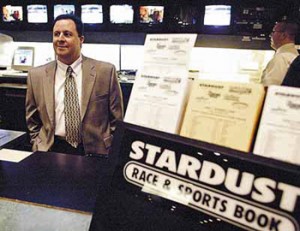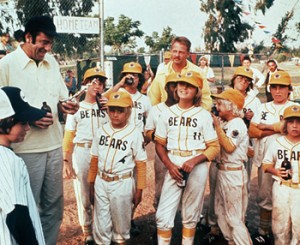 Ideally, large investment banks are like bookmakers. Sportsbooks set up a fair wager that will attract bettors. They set the line to attract equal action on both sides. As the wager starts to attract bettors, the line readjusts to make sure the action is balanced. If a sportsbook still ends up having unbalanced action, it will work with other sportsbooks to offload the risk of its position. And it makes money from the action — not the ultimate result of the wager.
Ideally, large investment banks are like bookmakers. Sportsbooks set up a fair wager that will attract bettors. They set the line to attract equal action on both sides. As the wager starts to attract bettors, the line readjusts to make sure the action is balanced. If a sportsbook still ends up having unbalanced action, it will work with other sportsbooks to offload the risk of its position. And it makes money from the action — not the ultimate result of the wager.
But in reality, investment banks may be less ethical and dumber than sportsbooks — even the mobbed up illegal kind. Or at least, that’s my read of the Goldman Sachs Abacus deal.
The Wager:
In sportsbooks, a fair wager is considered one where the outcome is not rigged. It doesn’t mean there isn’t a favorite — that bias is theoretically removed by the odds or the setting of the line. It is also assumed that each bettor will have equal access to the, somewhat imperfect, information that is germane to the result. A team’s past performance and statistics can be thoroughly researched, injuries are public information, etc.
In the Abacus case, the SEC’s primary argument is that the initial wager was not fair.
In effect, Goldman Sachs had been asked to set up a portfolio of investments that one specific investor — hedge fund manager John Paulson — wanted to bet against. In fact, they let Paulson hand pick the investments to increase the probability of their failure. But instead of divulging the true nature of the portfolio, Goldman said the portfolio was set up by a separate company of experts, who specifically hand picked the investments to succeed.
In Goldman’s Abacus presentation to customers, found here, many pages detail how successful the selection company had been at picking winners; none of its rated notes had ever been downgraded. And what’s more, the company’s economic interests were aligned with potential investors; the company bet on these things to win all the time.
 Imagine a sportsbook set up a wager on the outcome of two amateur baseball teams. The sportsbook told bettors that the lineup for one team had been hand picked by a group of coaches and managers who knew all about the players. Not only that, teams hand selected by this group had always won. In reality, however, the lineup was selected by the opposing coach — designed to give his team the advantage.
Imagine a sportsbook set up a wager on the outcome of two amateur baseball teams. The sportsbook told bettors that the lineup for one team had been hand picked by a group of coaches and managers who knew all about the players. Not only that, teams hand selected by this group had always won. In reality, however, the lineup was selected by the opposing coach — designed to give his team the advantage.
Goldman will argue that they gave bettors/investors the starting lineup and they should have been smart enough to assess the team’s strength on their own. But these investments were not run of the mill. And like amateur players, their strengths and weaknesses were not easy to assess. Goldman obviously believed that investors would have to rely on expert opinion — which is why it spent page after page bestowing the virtues of the experts who had allegedly hand selected and vetted the portfolio.
Goldman also claims that the selection process was not material and it wasn’t obligated to divulge Paulson’s involvement. This seems disingenuous. Goldman obviously thought the selection process was important enough to detail in their presentations to investors. It believed that the selection process would be a selling point and encourage investors. By its own actions, Goldman lends credence to the argument that the selection process was material. That the company neglected to inform investors of Paulson’s involvement was a material omission.
The Line:
A big bet will move the line on a wager. In public investments, the same is true. If big investors want to make a large wager, they know they will move the line. Paulson probably could have found a number of public trades to make his wager but he didn’t want to move the line — or have to pay a premium to attract an opposing position. That’s why he went to Goldman. In a private offering, Paulson got the terms he wanted, Goldman fixed the line, and the opposing investors ended up with sub-optimally priced risk.
While not illegal, Goldman screwed over buy-side investors in this particular deal. The best explanation for how this played out can be found here.
 The Risk:
The Risk:
Investment banks and sportsbooks play an important roll in investing and wagering; they offer liquidity. Theoretically, by virture of their size and ability to offset risk, they can offer investors/bettors efficiently priced action that they couldn’t otherwise get from small operators.
Every sportsbook works like crazy to manage its risk as it attracts a maximum amount of action. It’s a tough balancing act but one that insures the sportsbook’s continued profitability and longevity. The last thing they want is to end up with an unbalanced position. Their goal is to be outcome neutral.
Goldman asserts it did not turn a profit on the Abacus deal, as if this were relevant to motive. According to Goldman, it ultimately lost $90 million because it ended up retaining a position in the Abacus deal.
There are two possibilities to explain Goldman’s folly. Goldman wanted to bet on the security because they believed Paulson was wrong. Or, Goldman couldn’t offload its risk and got stuck holding the bag. That either makes the folks at Goldman piss poor investors or inept at handling risk — neither high praise for an investment bank. There is some evidence, however, that Goldman did derive some secondary benefits from the Abacus deal, detailed here.
 The Irony:
The Irony:
A sportsbook that misleads its customers about the nature of a wager, makes those same customers wager with an unfair betting line, and doesn’t offload its risk, doesn’t stay in business very long. In fact, I’m sure there are bodies buried in the desert that would testify to that — if they could.
It surely wouldn’t receive a government bailout of $12 billion and turn around and give its bookies $14 billion in bonuses.
At work, people hold the investment community in high esteem — certainly higher than my gambling buddies. They think it’s odd and unseemly that I know people who have done time, like my friend Vinnie Procopio. And yet I think guys like Vinnie are more ethical and smarter than many in the investment world. Their only mistake was where and who they worked for. In Atlantic City, they got arrested. On Wall Street, they might be lauded for having a prudent business model, based on a track record of ethical deals.
Vinnie recently got out of county, where he had been sentenced to serve 364 days for his involvement in an illegal sportsbook operation. If Goldman Sachs were smart, it would hire these guys. It could only help its reputation.
For instance, some of the guys were indicted on charges that they helped offset risk: “Four other alleged bookmakers were charged, not as members of Micali’s ring but for allegedly accepting “layoff bets” from Micali, meaning bets that Micali’s ring initially accepted but that were ultimately viewed as exposing the ring to unacceptably big losses if certain sporting events didn’t go their way. Those four men allegedly agreed to take over the layoff bets, allowing Micali’s ring to better balance its wagers.”
The case against Goldman Sachs could be protracted. In the end, they could settle and/or beat the rap. After all, what is unethical isn’t always illegal. And for that matter, what is ethical isn’t always legal.
Top picture: The legendary Bob Succi, former sportsbook manager at the Stardust — the man behind the line.
6 Comments